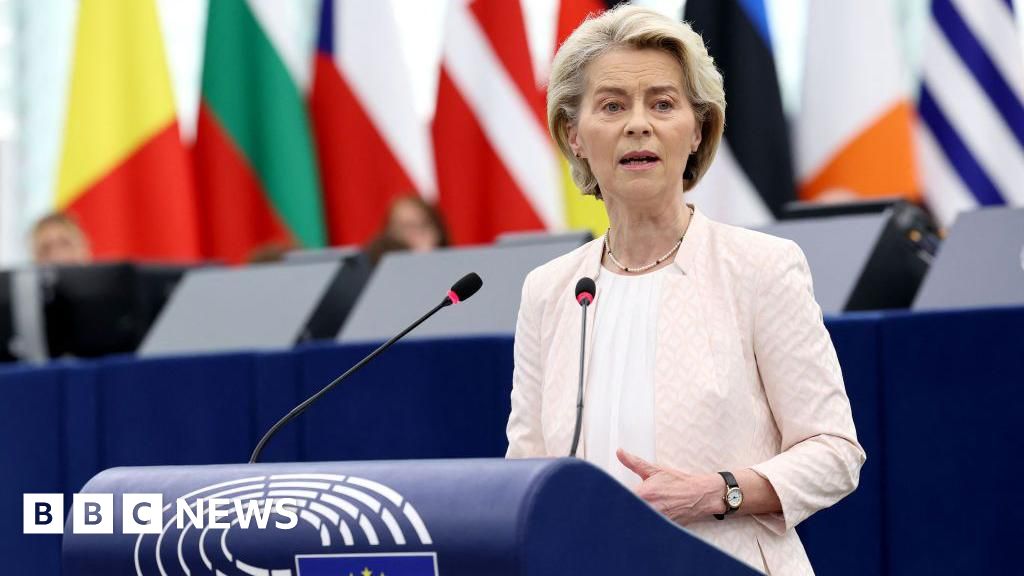Image source, Frederic Florin/AFP
- author, Laura Gozzi
- role, BBC News
-
European Commission President Ursula von der Leyen told the European Parliament ahead of a crucial vote in Strasbourg that if she were to serve a second term she would focus on defence, security and climate policy.
“Let’s choose strength,” she told parliament, promising a “shield of European democracy”.
Von der Leyen, who has been European Commission president since 2019, needs 361 votes in the 720-seat parliament to secure another five-year term.
With support from her own centre-right European People’s Party (EPP), the Social Democrats and the liberal Renew, she should have enough votes.
No other candidates are running, but the secret nature of the ballot means MEPs can vote without following party lines, which could make voting difficult.
Von der Leyen gave a wide-ranging speech ahead of the vote, setting out a series of policy pledges and seeking to address the concerns of each political group.
She lobbied Green MEPs, saying she wanted the EU to stick to its climate goals, and vowed that under her leadership the EU would introduce a target to cut greenhouse gas emissions by 90% by 2040.
Aligned with her centre-right European People’s Party, she said she would set up a common defence project, including a European air defence force, and appeared to address concerns on the right by promising to triple the number of border guards and strengthen Europe’s borders.
There was also mention of social rights, affordable housing and the need to end the “bloodshed in Gaza”, addressing the concerns of many MEPs on the left.
Von der Leyen drew thunderous applause when she criticised Hungary’s Viktor Orban’s recent visit to Moscow.
“This so-called peace mission was nothing more than an appeasement mission,” she told MEPs, without naming the Hungarian leader.
At the end of her speech, she called on Parliament to vote for her again, saying, “History will continue to knock at Europe’s door and the need for Europe will be stronger than ever.”
It will be known later on Thursday whether the speech was successful in securing von der Leyen a majority.
Voting will take place at 13:00 (11:00 GMT) and the results will be announced two hours later.
If von der Leyen does not get through today’s European Parliament vote, the EU will be back to square one, with leaders having to agree on a new candidate who will then be approved by the European Parliament.
Although names have been mentioned, no obvious replacement has emerged so far.
Von der Leyen won the post five years ago after EU leaders put her name forward at the last minute after a political deadlock over other candidates.
At the time, she won by just nine votes more than the majority needed, and Thursday’s vote could be just as close.
Since being nominated for a second term, von der Leyen has held private meetings with several parliamentary groups, trying to secure their votes.
Her efforts have not always been successful: After one meeting, MEPs from the Left group said they had decided not to vote for von der Leyen because of her commitment to increasing military and defence spending.
She also met with the Green party and received positive signals, although some MEPs said they would wait to hear von der Leyen’s speech on Thursday before making any final decisions.
The delegations of Romania, France and Poland have said they will vote against the bill, but she has reportedly succeeded in persuading some members of the right-wing European Conservatives and Reformists (ECR) party to support her.
The Italian prime minister, who heads the European Parliament, is also said to be postponing a decision on how to instruct Italy’s 24 MEPs to vote until after von der Leyen has spoken.
But Italian media reports suggest she is leaning towards supporting von der Leyen in exchange for being offered a senior role in the next European Commission, including one of Italy’s coveted areas of economy and competition.
Meloni, leader of the far-right Brothers of Italy party, has achieved prominence on the European right.
Image source, Getty Images
The third largest group in parliament, the newly formed Patriots for Europe, founded by Hungarian Prime Minister Orban and which includes leaders of far-right parties in France, Austria and the Netherlands, refused to back von der Leyen.
There is also a possibility that some obstacles may arise from within the centrist party that forms the core of von der Leyen’s support base.
Several centrist Irish MEPs have said they will vote against her nomination because of her stance on the Gaza war, and several French MEPs from Ms von der Leyen’s own European People’s Party (EPP) have also said they will not support her.


